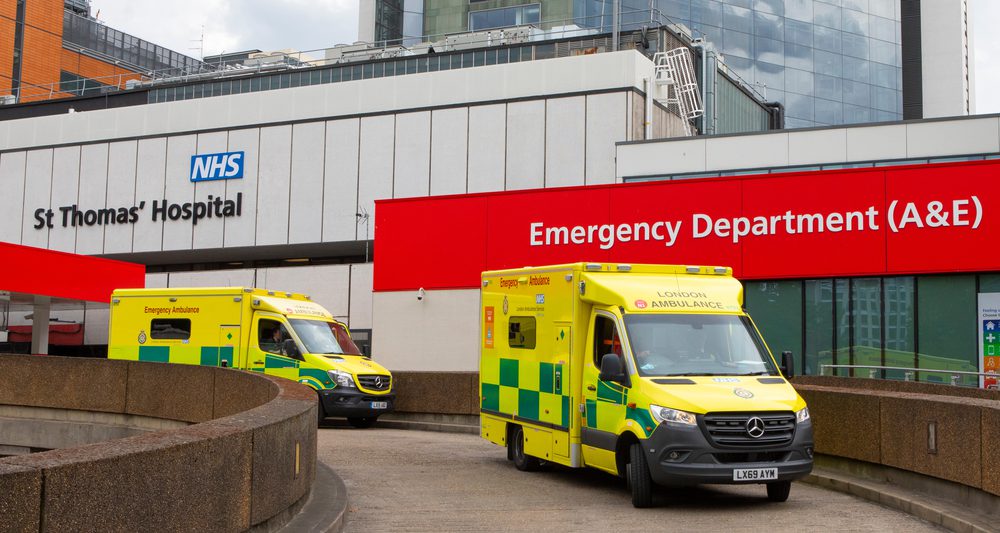
The UK’s health service—a source of the nation’s pride for over 75 years—is close to buckling this winter due to an ill-timed confluence of pressures. Various senior health officials are sounding the alarm while preventable deaths are skyrocketing.
Matthew Taylor, chief executive of the NHS (National Health Services) Confederation, told Sky News on January 2nd that he speaks to NHS leaders “every day and a lot of them, if not most of them, say this is the toughest winter they’ve ever dealt with,” adding his own view that they “cannot go on like this.”
Taylor, who is a representative of NHS trusts and other healthcare leaders, noted that “most parts of the health service are under an unbearable strain and that does mean that we are not able to provide service as usual.” Taylor is observing a triage of sorts taking place, in that the NHS is focusing all its energies “on the most urgent and intense needs, and that’s why you’re seeing the declaration of critical incidents in so many places.”
Seven health trusts (an organizational unit within the NHS of England and Wales, which serves either a geographical area or has a specialized function) currently have such critical incidents in place, which means they cannot function as usual due to extraordinary pressure.
Publically, at least 55 NHS trusts have attested to struggling to meet demand. Last week, NHS data shows, one in five ambulance patients had to wait longer than an hour before being handed over to A&E teams.
On Christmas Day alone, more than one in seven people who needed assistance following an accident or during an emergency did not even see an ambulance within the hour—a number almost 10 times higher than in 2021 and 17 times higher than in 2020.
Dr. Tim Cooksley, president of the Society for Acute Medicine, advocated “urgent action” as, in his words, “there has never been a greater recognition amongst all staff that our current situation is worse than it has ever been,”—not even during the COVID-19 pandemic at its peak.
Dr. Adrian Boyle, president of the Royal College of Emergency Medicine, added to the alarm when on New Year’s Day he said that between 300 and 500 people are dying unnecessarily each week because of such delays.
The weekly deaths figures were however questioned by NHS chief strategy officer Chris Hopson, who did not recognise them.
“We don’t know about the waiting-time figures because they don’t come out for a couple of weeks,” Dr. Boyle noted, but then said he “would be amazed if they are not the worst ever that we’ve seen over this December.”
Dr. Boyle added that a severe flu outbreak, exacerbated by a lack of immunity in people due to COVID-19 isolation measures, has meant that bed occupancy is at a record level.
“If you look at the graphs,” Dr. Boyle observed, “they all are going the wrong way, and I think there needs to be a real reset. We need to be in a situation where we cannot just shrug our shoulders and say ‘This winter was terrible, let’s do nothing until next winter.’”
While recognizing the need for an increase in hospital capacity, he said they “need to make sure that there are alternative ways so that people aren’t all just funneled into the ambulance service and emergency department.”
On Monday evening, the British Medical Association (BMA) stated that pressure on the NHS is “intolerable and unsustainable,” while its council chair called on the government to “step up and take immediate action” to solve the crisis.
Earlier that day, Education Minister Robert Halfon conceded that the NHS was dealing with pressures but said he was “absolutely clear that the prime minister [Rishi Sunak] treats this as a top priority.”
Halfon added that the government is increasing NHS capacity “by the equivalent of 7,000 beds, spending an extra £500 million to speed up hospital discharge and improve capacity.” While he defended the government’s response, he recognized more could be done. “The government is putting in a lot of funding and doing everything possible,” he explained, noting that “many of these problems have been caused by the pandemic and the pressures on the NHS that we’ve seen over the past few years.”
With each passing day, the Tory government is more and more upbraided over its seeming inertia in face of an all-encompassing crisis. As even access to a general practitioner has become a tricky proposition for far too many, the ongoing hobbling of Britain’s health service is thrown into sharp relief.
The current state of affairs has moved Liberal Democrats leader Sir Ed Davey to label it a “national scandal.”
Since “face-to-face GP appointments have become almost extinct in some areas of the country,” this creates “a devastating situation where people are left treating themselves or even self-prescribing medication because they can’t see their local GP,” he lamented.
Accusing the government of failing to fulfill its pledge to recruit more doctors, Sir Davey urged ministers to recruit another 8,000 GPs.
